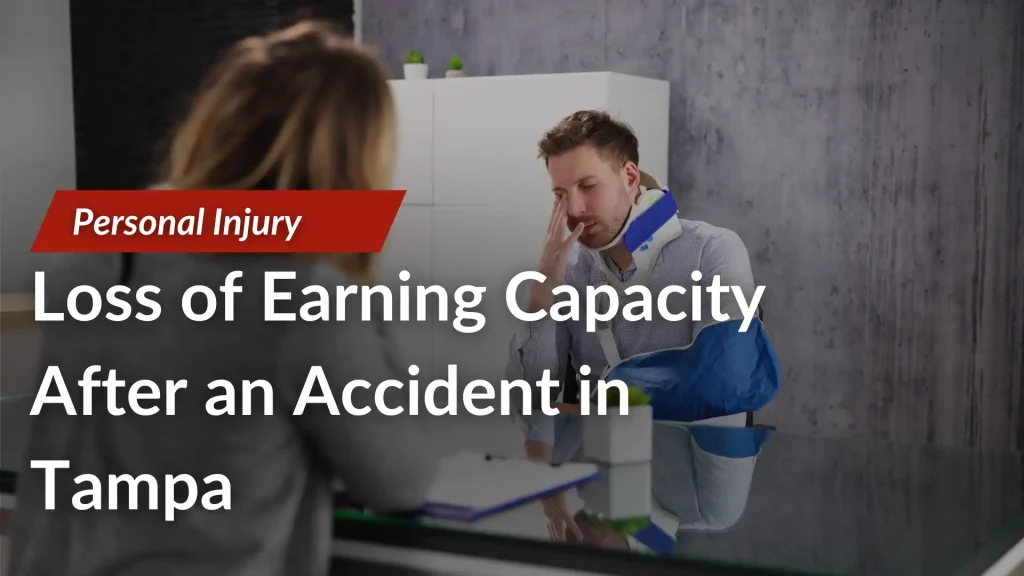 An accident can cause significant financial repercussions, including medical expenses and lost wages from missing work during recovery. But what happens if your injuries compromise your ability to earn a living? If you’ve suffered an accident-related injury that has diminished your earning potential, you may be entitled to compensation for this loss. Understanding the loss of earning capacity and its calculation can be crucial in securing the financial support you need to move forward.
An accident can cause significant financial repercussions, including medical expenses and lost wages from missing work during recovery. But what happens if your injuries compromise your ability to earn a living? If you’ve suffered an accident-related injury that has diminished your earning potential, you may be entitled to compensation for this loss. Understanding the loss of earning capacity and its calculation can be crucial in securing the financial support you need to move forward.
Understanding Loss of Earning Capacity
Loss of earning capacity refers to an individual’s reduced ability to earn income due to injuries sustained in an accident. Unlike lost wages, which account for actual income lost during recovery, loss of earning capacity considers the long-term impact on a person’s ability to work at their previous level.
Including loss of earning capacity in injury claims ensures compensation reflects future financial losses, not just immediate expenses. This approach helps the injured person achieve long-term financial security.
Factors in Calculating Loss of Earning Capacity
Calculating lost earning capacity involves analyzing how injuries affect a person’s future work potential. This includes reviewing their work history, skills, and injuries. By evaluating these aspects, experts can estimate how the person’s ability to earn a living has been altered. This includes both current and future earning capacity. This calculation often requires expert testimony and financial modeling to ensure a fair and accurate representation of potential income loss.
Some factors that go into calculating lost earning capacity include:
- Nature and Severity of Injury – The type and extent of injuries play a critical role. Permanent disabilities or chronic conditions can significantly impair one’s ability to work.
- Age and Life Expectancy – Younger individuals may experience a greater loss because they have more working years ahead of them.
- Occupation and Skills – The injured person’s job and skill set also determine how their earning potential might be affected. Highly specialized skills may not be easily transferable to other roles.
- Pre-Accident Earnings – Historical earnings provide a baseline for estimating future income loss.
- Educational Background – Higher education and specialized training can influence one’s ability to adapt to new job roles after injury.
- Employment Opportunities – Given the injured person’s limitations, the availability of suitable employment opportunities will also affect the calculation of lost earnings.
Key Types of Evidence Used to Calculate Lost Earning Capacity
Several types of evidence are used to calculate lost earning capacity. This is to establish how an individual’s ability to earn income has been impacted by their injuries:
- Medical records and expert testimonies from healthcare professionals provide insight into the severity and long-term effects of the injury, demonstrating its impact on the individual’s work capabilities.
- Employment history and tax records are examined to establish the individual’s prior earning capacity and career trajectory.
- Vocational experts assess how the injury affects the individual’s job skills and opportunities in the labor market. They also analyze potential career paths and earning potential.
- Economic experts may analyze market trends and conditions to project future income and employment opportunities.
- Personal testimonies from the injured person, their employer, and colleagues can also offer valuable perspectives on how the injury has affected work performance.
This comprehensive approach ensures a thorough assessment of lost earning capacity for fair compensation.
How Attorneys Help Recover Compensation for Reduced Earning Potential After Accidents

A Tampa personal injury lawyer is key in helping an injured person recover compensation for lost earning capacity. The do this by bringing their legal experience and strategic guidance to every stage of the claims process. First, they evaluate the case, determining the extent of the injury and its impact on their client’s ability to work. They gather comprehensive evidence to build a robust case demonstrating the client’s diminished earning potential.
Attorneys will also turn to experts with whom they’ve built relationships to help them get the full picture of their client’s experience and the effects of their injuries. They’ll collaborate with medical experts, vocational rehabilitation specialists, and economic analysts. They then present a clear and convincing argument that highlights the long-term financial implications of the injury. They also use expert witnesses to explain complex concepts in court, such as how the injury affects the client’s work capacity and future job prospects.
Furthermore, attorneys handle negotiations with insurance companies. This gives injured parties a much greater advantage in fighting for the compensation they deserve. Insurers are financially interested in minimizing payouts and rarely offer a victim a reasonable settlement. This is why having an attorney makes such a difference. They’ll use their negotiation skills to advocate for a fair settlement that accurately reflects the client’s loss of earning capacity.
If the parties can’t reach a fair settlement agreement, the attorney can file a lawsuit and take the case to court. They can then present evidence and arguments to a judge or jury to secure a favorable verdict. By managing the legal process and fighting for their rights, an attorney maximizes the client’s potential for recovering fair compensation for their lost earning capacity and other accident-related losses.
Contact an Experienced Tampa Personal Injury Attorney Today
If you suffered injuries in an accident due to someone else’s fault, you need skilled legal support to pursue the compensation you deserve. Since 2007, Jurewitz Law Group Injury & Accident Lawyers has provided personalized representation to injured people and their families throughout the Tampa area, helping them secure the compensation necessary to move forward after devastating accidents. Honored by local and national organizations and the recipient of more than 250 five-star reviews from clients, the firm is proud to advocate for people harmed by others’ negligence and hold the responsible parties accountable for their actions. Contact us online or by calling (619) 233-5020 to discuss your case in a free consultation.
Related Posts:
The Hidden Dangers of Black Ice and Tampa, Florida Car Accidents
What Insurers Don’t Tell You About the Emotional Costs of a Car Wreck


